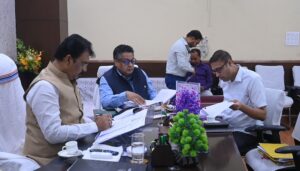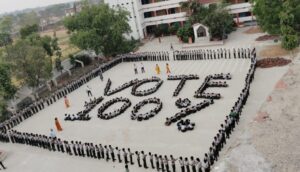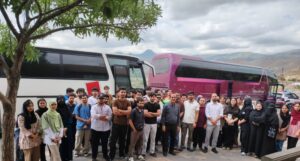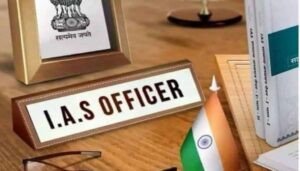Workshop in Patna Marks 150 Years of IMD, Highlights Weather and Climate Services

Patna: The “Stakeholders Workshop on Weather and Climate Services” was held on Wednesday in Patna, commemorating the 150th establishment year of the India Meteorological Department (IMD). Bringing together stakeholders from government agencies, agriculture, health, disaster management, and related sectors, the event highlighted the vital role of weather and climate services in fostering resilience and sustainable development in Bihar.
The workshop was inaugurated by Bihar’s Deputy Chief Minister, Samrat Chaudhary, alongside Chief Guest Sahila, Joint Secretary of the Disaster Management Department. Other dignitaries on the dais included Dr. M. Mohapatra, Director General of IMD; Dr. Rajendra Kumar Jenamani, Head of the National Weather Forecasting Centre, New Delhi; Neeraj Narayan, Member Secretary of the Bihar State Pollution Control Board; and Ashish Kumar, Head of the Meteorological Centre, Patna.
Inaugural Highlights

The event began with the ceremonial lighting of the lamp and invocation. The second edition of IMD’s technical Hindi magazine, Aditya, was launched, and two major meteorological facilities—the Aerodrome Meteorological Office and an Automated Weather Observation System (AWOS) at JPNI Airport, Patna—were virtually inaugurated by Samrat Chaudhary and Dr. Mohapatra.
During a press meet, Dr. Mohapatra outlined the objectives of the workshop, shared updates on IMD’s activities, and discussed future projects, including the Doppler Weather Radar in Purnia.
Technical Sessions

The workshop featured three technical sessions that delved into various aspects of weather and climate services.
In the first session, Dr. Rajendra Kumar Jenamani, Head of the National Weather Forecasting Centre, New Delhi, delivered an overview of weather forecasting and its future advancements. Nadeemul Ghaffar Siddiqui, Joint Secretary of the Disaster Management Department, discussed the development of disaster management systems and early warning mechanisms in the state.
Dr. Abdus Sattar, Assistant Professor and Nodal Officer for Agrometeorology at RPCAU, Pusa, highlighted the significance of special weather advisories for farmers. Prashant Kumar, Director of the Centre for Mathematical Modelling at water resources department elaborated on impact-based hydro-meteorological services in Bihar, while Dr. Ragini Mishra, State Surveillance Officer at the State Health Society, detailed the influence of meteorological services on public health.
The second session on special topics covered a range of diverse themes, including disaster mitigation, aviation weather services, and air quality monitoring. Ashwani Kumar, Deputy Commandant, 9 Battalion, National Disaster Response Force (NDRF), detailed improved early warning systems for disasters, while Prof. Pradhan Parth Sarthi of CUSB shared valuable insights on research and development in meteorology.

Vishal Ranjan, DGM (ATM), Airports Authority of India, Patna, discussed the role of weather services in aviation operations. Dr. Neha Parik of Bihar Agricultural University highlighted the significant impact of weather on agriculture. Dr. Dipankar Saha from the Bihar State Pollution Control Board explored the Air Quality Index (AQI) and its implications for human health. Dr. Shashidhar Jha from WRI India presented strategies to leverage IMD data for building a climate-sensitive and low-carbon future for Bihar.
The final session, chaired by Dr. Anjani Kumar, Director of ATARI, Patna, included a brainstorming session and panel discussion. Key issues such as service gaps, user feedback, and potential improvements in weather and climate services were deliberated.

The event concluded with a vote of thanks and felicitation of retired staff of Patna meteorological centre, marking the end of a day that reinforced the significance of weather and climate services in building a sustainable and resilient future for Bihar.








